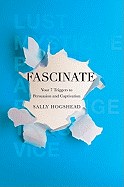Broken Windows, Broken Business
February 11, 2010
The first thing I saw staring back at me from my email this morning came from the author of Fascinate, Sally Hogshead, whose manifesto led yesterday's ChangeThis issue. Being from Sally, it was a kind and generous message, but there was something there at the end that made my stomach feel a bit more empty than it really was. "Could you fill in my URL on the intro page (I think it's just blank right now)" she asked.
The first thing I saw staring back at me from my email this morning came from the author of Fascinate, Sally Hogshead, whose manifesto led yesterday's ChangeThis issue. Being from Sally, it was a kind and generous message, but there was something there at the end that made my stomach feel a bit more empty than it really was. "Could you fill in my URL on the intro page (I think it's just blank right now)" she asked. Yes, I had left her bio page up overnight, reading:
 Jack has been talking with Michael Levine recently, which has prompted us to take a new look at his book, Broken Windows, Broken Business: How the Smallest Remedies Reap the Biggest Rewards, released by Business Plus in 2006. His idea developed out of a 1982 article in The Atlantic by criminologists James Q. Wilson and George Kelling titled "Broken Windows." In the article, Wilson and Kelling suggest that the proper enforcement of minor crime lowers not only the overall crime rate, but the rate of major crimes as well. They conclude:
Jack has been talking with Michael Levine recently, which has prompted us to take a new look at his book, Broken Windows, Broken Business: How the Smallest Remedies Reap the Biggest Rewards, released by Business Plus in 2006. His idea developed out of a 1982 article in The Atlantic by criminologists James Q. Wilson and George Kelling titled "Broken Windows." In the article, Wilson and Kelling suggest that the proper enforcement of minor crime lowers not only the overall crime rate, but the rate of major crimes as well. They conclude:
 Michael Levine takes this lesson and applies it to business. The "broken windows" in this case are lapses in the environment a business creates for their customers.
Michael Levine takes this lesson and applies it to business. The "broken windows" in this case are lapses in the environment a business creates for their customers.
 Jack has been talking with Michael Levine recently, which has prompted us to take a new look at his book, Broken Windows, Broken Business: How the Smallest Remedies Reap the Biggest Rewards, released by Business Plus in 2006. His idea developed out of a 1982 article in The Atlantic by criminologists James Q. Wilson and George Kelling titled "Broken Windows." In the article, Wilson and Kelling suggest that the proper enforcement of minor crime lowers not only the overall crime rate, but the rate of major crimes as well. They conclude:
Jack has been talking with Michael Levine recently, which has prompted us to take a new look at his book, Broken Windows, Broken Business: How the Smallest Remedies Reap the Biggest Rewards, released by Business Plus in 2006. His idea developed out of a 1982 article in The Atlantic by criminologists James Q. Wilson and George Kelling titled "Broken Windows." In the article, Wilson and Kelling suggest that the proper enforcement of minor crime lowers not only the overall crime rate, but the rate of major crimes as well. They conclude:
Just as physicians now recognize the importance of fostering health rather than simply treating illness, so the police—and the rest of us—ought to recognize the importance of maintaining, intact, communities without broken windows.
 Michael Levine takes this lesson and applies it to business. The "broken windows" in this case are lapses in the environment a business creates for their customers.
Michael Levine takes this lesson and applies it to business. The "broken windows" in this case are lapses in the environment a business creates for their customers.
"A broken window can be a sloppy counter, a poorly located sale item, a randomly organized menu, or an employee with a bad attitude. It can be physical, like a faded, flaking paint job, or symbolic, like a policy that requires consumers to pay for customer service."Increasingly, it can be digital, such as my coding error that caused Sally Hogshead's bio to read "Find out more about creating fascinating messages at [birds chirping]"—for more than eight hours. I think that sloppy code on a website can easily be as harmful as a messy aisle at a grocery store or movie theater (I've worked at both) and takes a lot more (or at least vastly different) talent to clean up. It was an honest and simple error (I forgot a bracket), but if I would have paid closer attention before moving on to the next thing, I would have done a better job for a hard-working author and saved myself from coming in to unnecessary worry first thing in the morning. So, pay attention to that code, folks! (Or that shelf display, customer service or returns policy.) Not only will worrying over the details save you greater worry later, but as Michael Levine shows in Broken Windows, Broken Business, it's the "constant vigilance to the tiny details can make or break a business or a brand."


